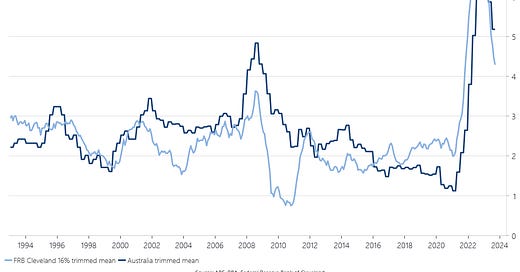Michele Bullock moves away from ‘leaning against the wind’
Plus, Australia lagging the US disinflation process; Q3 nowcasts; and Vale Max Corden
Michele Bullock’s first speech as RBA Governor was notable for its discussion of the role of financial stability in setting monetary policy. In particular, she made clear that financial stability considerations will ‘usually’ be subordinate to the inflation and full employment objectives:
In general, the Board balances its objectives by considering financial stability in its policy settings, without using monetary policy to influence financial stability directly. Financial stability considerations will influence monetary policy when it affects the outlook for employment and inflation. For example, if financial instability results in tighter credit conditions, this is relevant for meeting the Bank’s objectives. But if there seems to be tension between these objectives, the Board will usually prioritise its inflation and full employment objectives. This approach is widely accepted as best practice and is consistent with the recommendations of the Review.
The above framing is encouraging in suggesting that financial stability must first have macroeconomic impacts inconsistent with the inflation and full employment objectives to influence policy. Of course, if the macroeconomic outlook is impacted, a reaction function focused on inflation and full employment will respond even without an explicit financial stability overlay. Bullock’s speech would seem to be a subtle shift away from Governor Lowe’s approach of explicitly sacrificing the inflation and full employment objectives against merely apprehended financial stability risks.
While the new Governor would probably disavow any suggestion of discontinuity, the reference to the RBA Review signals that the Review’s findings and recommendations are being internalised under the new regime. Importantly, the changes in the RBA’s leadership reach well below Bullock. In my view, we are now dealing with a very different institution, with a leadership that is potentially much better connected with the rest of the Bank. It remains to be seen how the forthcoming Statement on the Conduct of Monetary Policy and amendments to the RBA Act address the relationship between financial stability and other objectives, but Bullock’s remarks are at least somewhat encouraging (see my detailed perspective here).


